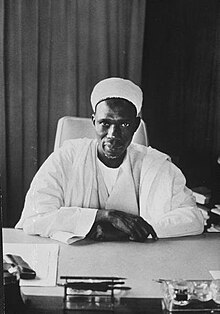Sir Abubakar Tafawa Balewa
|
The Right Honourable Sir Abubakar Tafawa Balewa P.C. |
|
|---|---|
 |
|
| 1st Prime Minister of Nigeria | |
|
In office 1 October 1960 – 15 January 1966 |
|
| President | Nnamdi Azikiwe |
| Preceded by | Post established |
| Succeeded by | Ernest Shonekan |
| Personal details | |
| Born | 1912 Bauchi, Northern Nigeria Protectorate |
| Died | 15 January 1966 (aged 53) near Lagos, Nigeria |
| Political party | Northern People's Congress |
| Spouse(s) | Four wives - Jummai, Umma, Zainab and Laraba |
| Alma mater |
Barewa College University College London |
| Religion | Islam |
Sir Abubakar Tafawa Balewa, KBE (December 1912 – 15 January 1966) was a Nigerian politician, and the first prime minister of an independent Nigeria.
Abubakar Balewa was born late in 1912 in Bauchi, the son of a district head in the Bauchi divisional district of Lere. Balewa's father Yakubu Dan Zala was of Gere ethnicity, and his mother Fatima Inna was half Gere half Fulani.
He started early education at the Koranic School in Bauchi and like most of his contemporaries, he studied at the Barewa College for further education and soon acquired his teaching certificate. He returned to Bauchi to teach at the Bauchi Middle School. In 1944, along with a few learned teachers from the north, he was chosen to study abroad for a year at the University of London's Institute of Education, which today forms part of University College London. Upon returning to Nigeria, he became an Inspector of Schools for the colonial administration and later entered politics. He was elected in 1946, to the colony's Northern House of Assembly, and to the Legislative Assembly in 1947. As a legislator, he was a vocal advocate of the rights of northern Nigeria, and together with Alhaji Ahmadu Bello, who held the hereditary title of Sardauna of Sokoto, he founded the Northern People's Congress (NPC).
Balewa entered the government in 1952 as Minister of Works, and later served as Minister of Transport. In 1957, he was appointed Chief Minister, forming a coalition government between the NPC and the National Council of Nigeria and the Cameroons (NCNC), led by Nnamdi Azikiwe. He retained the post as Prime Minister when Nigeria gained independence in 1960, and was reelected in 1964.
...
Wikipedia
